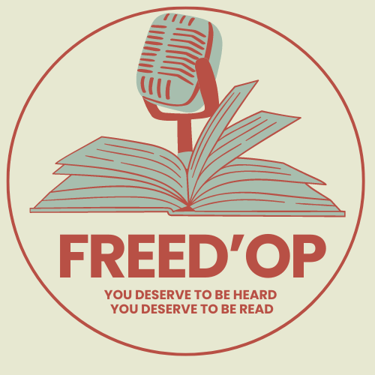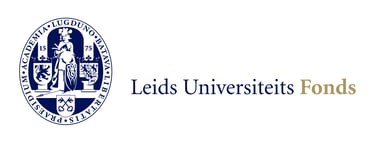While counting ballots - 23/02/2025
GERMAN ELECTIONS
Brody. L, Anna Vogt, Jakob van Ooijen
2/23/20259 min read
The wideness of roads can be traced back to imperial pride. Same as in Paris or Vienna. The designers knew, more was yet to come, marches would be carried on, museums would be built upon. After Berlin was bombed over by the Allies, the city lay buried under rubble and concrete debris; nearly everything needed rebuilding. Yet amidst all this destruction, something new rose up. Now it's exactly 2 PM; sunlight beams straight down onto my eyebrows as pedestrians move quietly forward, dragging shadows over a meter long behind them. Outside the Holocaust Memorial, nearby concrete blocks rise from a protruding foundation before descending in an unpredictable slope toward an unseen depth at their center. In the distance under shadows cast by rows of interlocking concrete blocks grinding against each other, I catch sight of an unassuming patch of white, the last bit of snow I see in Berlin.
As I walked past the Brandenburg Gate, a lighthearted atmosphere returned to people once again. Families held and hugged each other, and a group of girls roamed around, trying to find a perfect background for their bestie videos. Suddenly, a police armored vehicle blared the opening of Justin Bieber's Baby, deafening like a siren. The officers inside looked embarrassed and quickly turned it off, while their colleagues outside erupted in laughter. I entered the subway, taking the U5 line and getting off at Rotes Rathaus, right beneath the Berlin TV Tower, where a protest against budget cuts in higher education led by BSW was underway.
A friend of mine studying in Berlin showed me an email from her student organization that read: “Around a third of the financial means for the student organization were already cut for the year 2025. Necessary renovations for student housing or the funding for new, desperately needed housing were seemingly impossible with these cuts. Additionally, things like free canteen food or consultations with experts were in danger, as there is not enough funding for them.” The email ended with a political warning: “...the dismantling of the welfare state and the deterioration of living conditions is the breeding ground of extremist parties, thus further strengthening the AfD.”
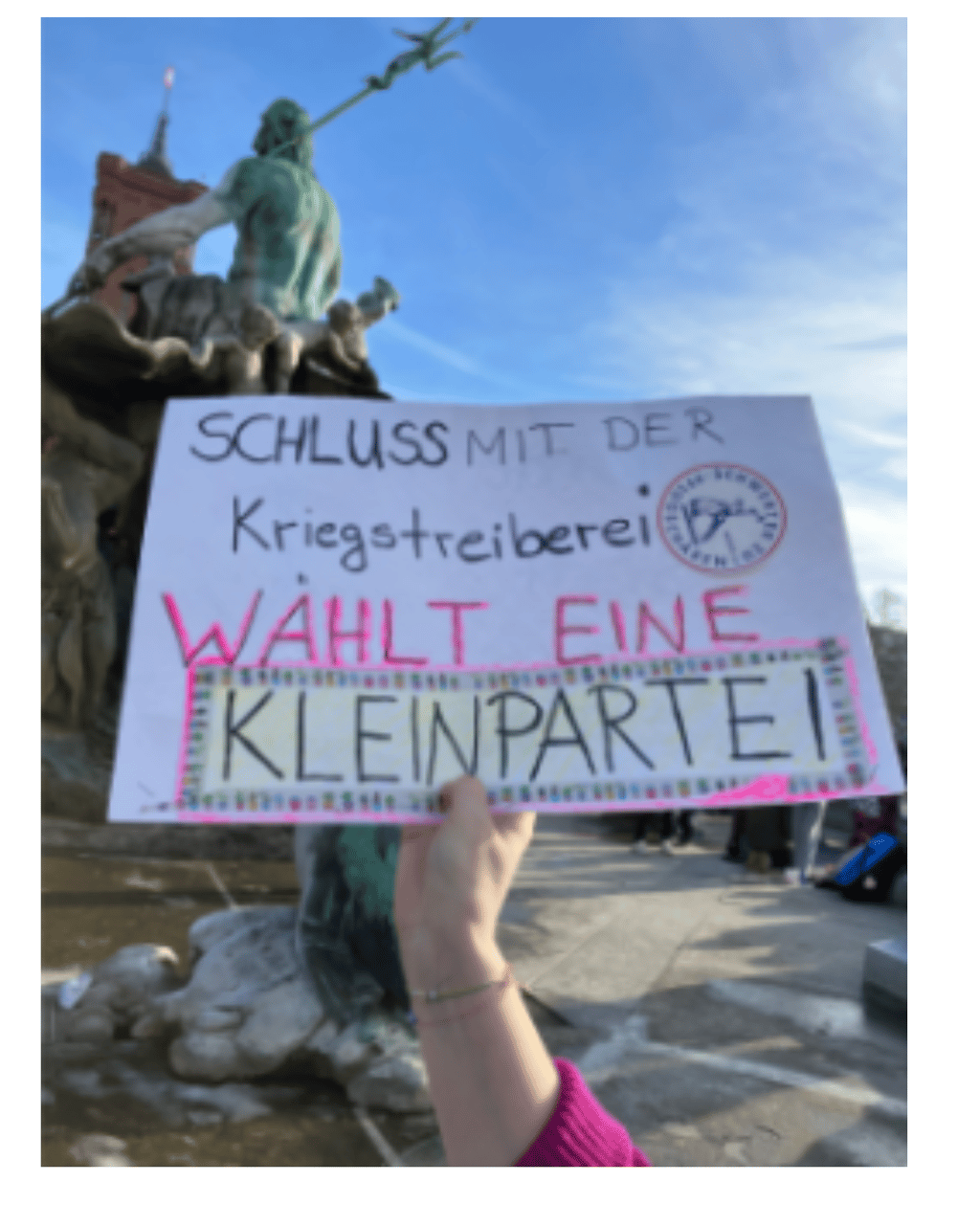

When I got out of the subway, all I could see was a sea of people. BSW and its supporters occupied Karl-Liebknecht Street entirely. At the front, a truck converted into a stage equipped with loudspeakers, where protest leaders delivered impassioned speeches that constantly prompted cheers and sharp whistles from the crowd. The BSW is a white whale in the German political landscape. It is the only party named after its leader, Sarah Wagenknecht (completely normal stuff, the other founders must have been buzzing about it), but it also vastly differs in its policy positions. Whilst they advocate for a strong social welfare state they lean more towards the right wing when it comes to issues like immigration. They are also together with the AfD, the most friendly towards Russia. Sarah Wagenknecht used to be an important member of Die Linke, however constant conflicts with other leading party members
led to her leaving the party with approximately half of the Bundestag parliamentary group of Die Linke. Its diverse policy positions have led to their supporters being from all walks of life: A woman in her fifties said earnestly, “Vote for smaller parties; we shouldn’t let big parties dominate parliament. We should use diplomacy instead of military aid to end the war in Ukraine.” A woman held up a placard while looking after children. Two little girls approached her asking for snack pretzels. She said, “This budget cut affects not only education but also art funding. Berlin is an art city, but…” She glanced at a little boy playing by the fountain before continuing, “Sorry, my English isn’t very good. This is my child.” I asked her if she felt optimistic about tomorrow's election. After looking at her son again, she shook her head with a smile and replied, “No.”
On the other side, beneath the dry Neptune Fountain, students wearing keffiyeh from the Palestine Solidarity Movement held banners and chanted "Free Free Palestine," joined by a few environmental activists and young communists waving their flags. A handful of police officers stood by, watching idly.
A woman in a red coat held a bouquet and a sign reading "Stop Antisemitism". At first, she was hesitant to speak with me, repeatedly stating, “I am a liberal.” Following her gaze, I noticed my hands were full of communist newspapers, flyers, and pamphlets. I explained that these were given to me by those communists. She then said, “German schools teach about the Holocaust as mere history while ignoring the reality of antisemitism.
Brody .L, Anna Vogt, Jakob van Ooijen
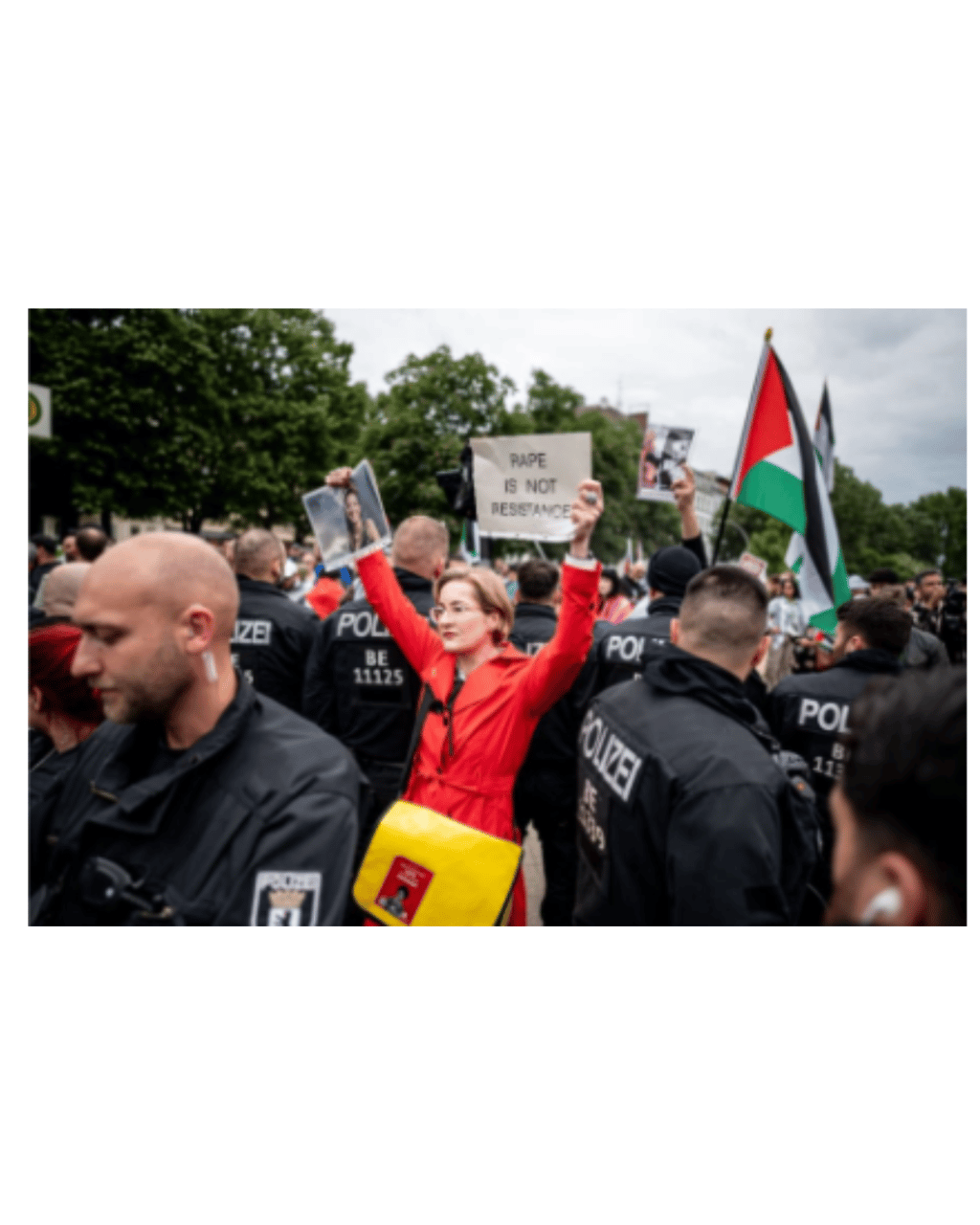

October 7th was absolutely wrong, yet antisemitism is increasing.” She pointed to a photo of a baby and said softly, “You know, she is also German. And she’s dead.” Her eyes glistened with unshed tears. This woman was no stranger to these protests: Her name is Karoline Preisler, she is a member of the FDP. She is a somewhat controversial figure: Heralded by German press outlets like Der Spiegel or Welt as a “Fighter against Israel haters and Antisemitism”, she regularly is present at pro Palestine protests holds signs like “Rape is not Resistance”. At these protests she is regularly confronted by protests with some confrontations escalating: She has been hit by eggs and bottles at the protests. At bigger protests, she is flanked by a multitude of heavy armed police officers. According to her, she wants to start a dialogue. Apparently that attitude is not always present.
Another protester, Jan, who had a disabled left eye, remarked passionately, “I’m not talking about millionaires but billionaires. Berlin is indeed poor; it’s outrageous not to tax billionaires here. Berlin’s strong leftist identity comes from being repeatedly liberated—East Berlin has long-standing communist legacies while West Berlin was once a refuge for men avoiding military draft in West Germany. Although right-wing parties have exploited communist history, leftist organizations that lacked parliamentary support in the 90s, have been deeply rooted in communities, establishing numerous cooperative housing and art projects. It’s unacceptable to witness decades of practice facing existential threats.”
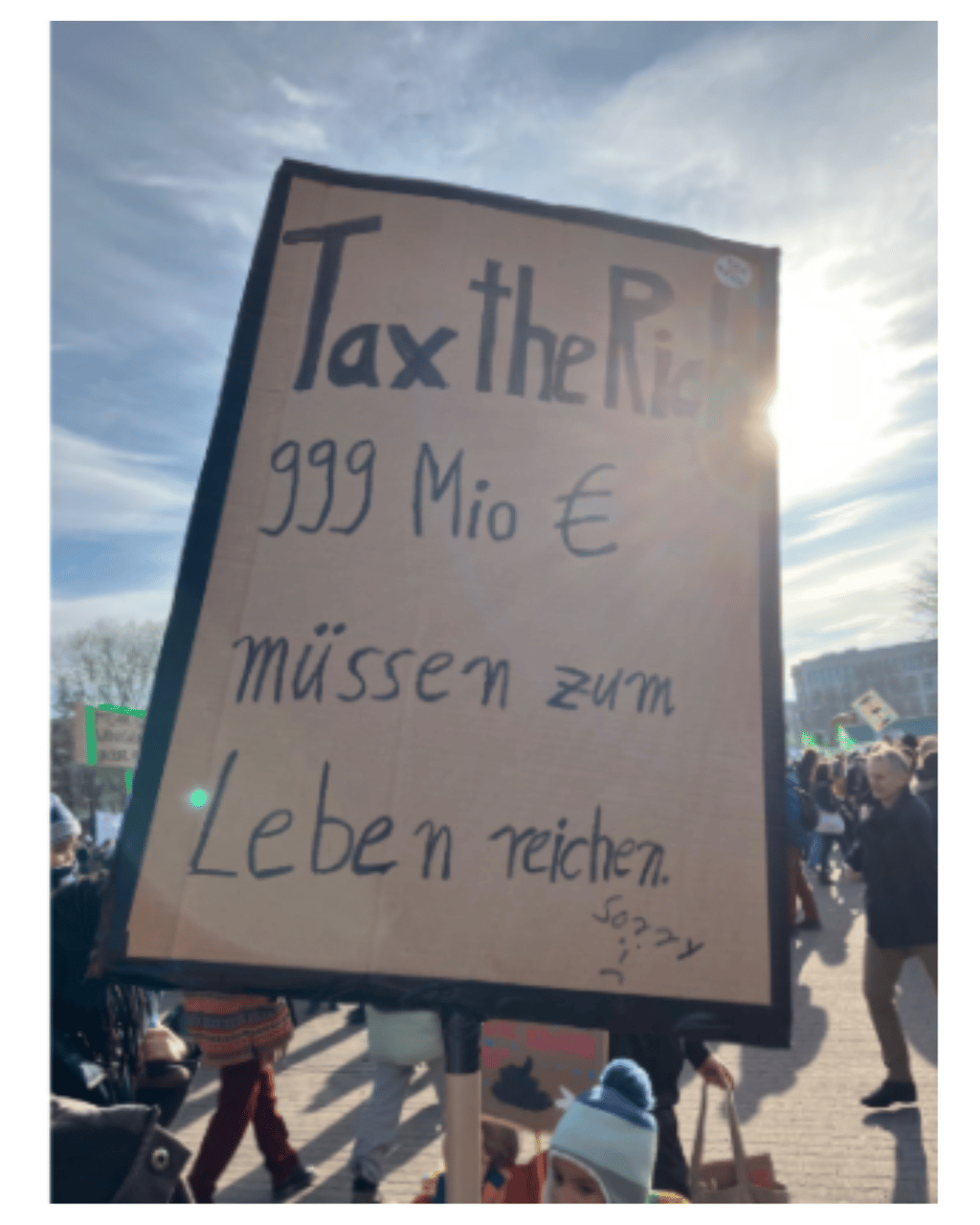

I followed the procession while conducting interviews until we reached Berlin Cathedral. Suddenly, from the front truck came singing. The singer announced, “I am also an immigrant. I came to Berlin 15 years ago. Then I learned German. I am so proud to be a Berliner! There are many people here—especially migrants—who don’t have voting rights. So please use your vote tomorrow and think about those who don’t have it. And don’t ever give up on your dreams! I’ve come a long way to be a singer; besides that, I’m also a comedian, an activist, queer—a drag queen—and yes, I’m also Jewish. Here in Berlin.” The whole march laughed.
As we passed the Altes Museum, I pulled out a flyer from a communist organization inviting me to a seminar at six o'clock. I thought, I knew where I would head next.
I walked quite a distance through commercial areas and somewhat dilapidated neighborhoods until I reached a community center near Kottbusser Tor. Through the glass doors, I saw several people seated at tables preparing to start; about twenty chairs were set up but only half were filled. The interior reminded me of an emptied bookstore. With the help of an interpreter, Leo, a man with a fine mustache, I managed to follow the discussion. The topics revolved around anti-right-wing movements, anti-racism efforts, and issues like Palestine—repetitive themes that finally left me drowsy.
The room was filled with young faces eager to engage in debate, and a few elderly who clearly caused troubles decades ago. One speaker began by addressing migration policies: "We need to focus on systemic racism and the shift to the right wing with parties like AfD." Another participant chimed in about how 15% of Germany's population lacks voting rights.
A passionate voice rose from the crowd: "All refugees in Germany have a right to be heard." They emphasized that without migrant contributions, Germany wouldn't enjoy its current prosperity. Someone else pointed out that it wasn't just AfD but also conservative parties like CDU that reflected racist tendencies: "It's an everyday challenge we face."
Another respondent shared personal experiences of dehumanization not only against Palestinians but also those involved in solidarity efforts. They noted how even at anti-AfD demonstrations, Palestinian elements were unwelcome—a stark contrast they found disturbingly similar between both political sides.
Suddenly, loud noises pierced through as an enthusiastic group of demonstrators marched down the street—almost all dressed in black and many wearing masks. They were followed closely by several police cars and even a SWAT vehicle. Everyone’s face seemed mysterious in short breaks of shadow, then turned emotional, covered by flashing red and blue lights; countless officers silently trailed behind them—perhaps forty or fifty in total. It took three or four minutes for the entire procession to pass by completely. Someone said “Red Army Faction.” The dull seminar finally dissolved under this excitement as half of the attendees rushed outside to see what was happening—I was no exception.
With questions swirling in my mind, I approached Leo who was smoking outside and thanked him for translating the seminar for two hours straight; honestly, I wanted to tell him it wasn’t worth it. He said he was happy to help.
Bewildered, I asked him how it could be the RAF if the third generation had already been gone for over thirty years. He explained the protesters were more like RAF sympathisers but indeed protesting for a member of the third generation - Daniela Klette, a suspected former terrorist. She was arrested a year ago after going on the run and living under a different identity for thirty years. Leo continued, explaining that a podcast hosted by a journalist was able to identify her through an AI software, opening a debate over the use of AI and privacy.
After thanking him again I followed after the RAF marchers.
Before long, I spotted the demonstration from afar. The police seemed unfazed from behind; they marched silently and orderly as if attending an unwanted ceremonial training. I crossed over the police, hoping to ask some questions. But three people in a row all refused without exception—either turning away or giving me wary looks
I noticed an alone man at the back of the demonstration who appeared relaxed despite being only five or six meters away from watching police officers; I approached him.
“Hey, I am doing a bit of journalism here…”, I said, attempting to gather more information. The man responded, explaining that he too had just stumbled into the demonstration. I proceeded to ask him why people were so reluctant to talk to me, to which he answered: “They are leftists”. Being the only person willing to talk, I decided to ask him about Daniela Klette. He explained that she had been held by police for a year now and despite being a suspected terrorist, was not charged with terrorism. Instead, they are charging her with attempted murder and armed robbery, framing her as a simple criminal rather than a political prisoner. Ironic, given that she claims that the money was used for the political organisation.
Having shook his hand, I moved toward the front of the crowd but faced more refusals. Until my gaze met that of an older man with gray hair, who gave out calmness coming with age. He had likely witnessed many upheavals throughout his life—threatened others and been threatened himself—and probably no longer took a stranger as a threat.
What was to worry about chatting with some curious young person anyway?
I mentioned the heavy police presence at the demonstration. In agreement, the old man pointed out the issue of police violence — or as he liked to call it ‘state violence’. “You know Francesca Albanese?” he asked. But before he could finish, a female police officer urged us to walk faster. Quickening our pace he continued, declaring his frustrations with the silencing of Franscesca Albanese, the UN Special Rapporteur on the Occupied Palestinian Territories, by the German police. Calling the government hypocritical, he explained they call what happened in Ukraine a genocide but suppressed similar comments about Palestine. The conversation diverged toward military expansion, which the old man considered connected to the selective recognition of genocide. Though aware of Germany’s condemnation of Russia’s actions in Ukraine, he believed this stance was also about justifying its own military interests. Referencing the expansion of the military in the 1930s, he warns that this is not the first time.
He leaned over, and looked at me very seriously. “And we are forgetting the lesson we learned from the Cold War. We’ve forgotten.”
A few minutes later, I said goodbye and turned around, walking to another street. A man wearing an aluminum all-spikes helmet rode slowly past on a red bicycle as police sirens faded into the distance.
